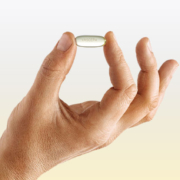Omega-3s and Cardiac Events
There was another study this week on omega-3 fatty acids. While the study I talked about last Thursday was small with only 21 subjects, this trial contained over 13,000 subjects from 675 hospitals and clinical centers all around the world. In this five-year study, one of the omega-3 fish oil medications was being tested to see if it would reduce cardiac events such as heart attacks, stroke, and death when compared with subjects taking a corn-oil placebo. The study was stopped early when it was clear there were going to be no significant differences in any of the outcomes that were being studied. In other words, the prescription fish oil did not reduce cardiovascular disease events.
While that may seem disappointing, there are some factors that most likely impacted the outcome and a couple that may have but could not be tested.
The Subject Pool
The subjects in this clinical trial had significant risk for CVD; they were required to have established coronary artery disease or significant risk factors to be included in the clinical trial. Those risk factors included being a type 1 or type 2 diabetic, with at least one additional risk factor including chronic smoking, hypertension, hs-CRP higher than two mg/L, moderately increased protein loss, or being older with similar factors as the diabetics.
The Data Not Collected
In reading the study, there were three criteria that came to mind that could have impacted the outcome if the corresponding data had been collected and considered in the statistical analysis. I emailed the relevant author and got the answers.
1. Were data collected on exercise habits of the subjects? No.
2. Were nutritional data collected on the subjects? No.
3. Was the form of omega-3 used, a highly purified carboxylic acid form, assessed as to how the metabolism impacts the omega-3s’ mechanism of action? No.
It seems to me that if the data could be analyzed on exercisers versus sedentary as well as using nutritional factors, even just daily caloric intake, there may have been significant results. As for the form of omega-3s, the CA form is highly absorbed and doesn’t require a fat in the diet to assist with that process. There might have been something else that happens during metabolism that normally assists in the risk reduction. We just don’t know.
The Bottom Line
The authors acknowledge that this subject pool was at high risk for cardiac events. One explanation is that the progression of disease may have already been too advanced and could have impacted the efficacy of the medication. For people with less established CVD, the omega-3s might have been more effective.
Many in the medical field wrote about the failure of omega-3s in medication or supplement form to prove that they have any impact on CVD events or mortality. I think they’re wrong. The one outcome they never test is the quality of life. Granted, it’s difficult to assess but if people can live their lives even 10% better, regardless of CVD events, that seems worth it. Paula and I are still taking our omega-3 supplements; in fact Riley takes one, too, even though he’s only five and we’re not concerned about his heart. Whether you’re worried about your heart or not, omega-3s have many benefits. This study shows no reason why you or I should stop taking them.
What are you prepared to do today?
Dr. Chet
Reference: JAMA. 2020;324(22):2268-2280. doi:10.1001/jama.2020.22258









